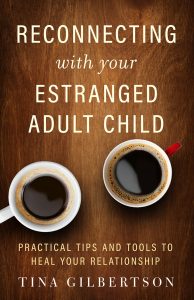
An excerpt from Reconnecting with Your Estranged Adult Child by Tina Gilbertson
Ten million Gen X and Baby Boomer parents have estranged adult children. Parents wonder: How did this happen? Where did I go wrong? While time, in and of itself, does not necessarily heal, actions do, and while every estrangement includes situation-specific variables, there are practical, effective, and universal techniques for understanding and healing these not-uncommon breaches. Psychotherapist and author of Reconnecting with Your Estranged Adult Child: Practical Tips and Tools to Heal Your Relationship, Tina Gilbertson has developed techniques and tools over years of face-to-face and online work with parents who have foundher strategies transformative and even life-changing. Gilbertson cuts through the blame, shame, and guilt on both sides of the broken relationship, so parents will feel heard and understood but also challenged —and guided — to reclaim their role as “tone setter” and grow psychologically.
We hope you enjoy this excerpt from the book.
Try some of the following self-esteem-building activities:
Correct people who guess at what you’re feeling and get it wrong. We all do it: guessing at other people’s feelings is a commonplace and usually innocent pastime. “I bet you’re thrilled your nasty coworker got fired,” is an example. So is, “You look angry.” Observers sometimes hit the nail on the head, but often they get it wrong. Use these episodes to get to know yourself better. Think about the label that’s just been put on you. How well does it fit at this moment? Maybe you were thinking about a serious subject, suddenly realizing it requires your attention. You’re not angry at all, but concerned. Correct the guesser, even if only in your mind, when he or she misinterprets how you feel. It’s a subtle way of telling yourself that what you really feel is important.
Try something you want to do that’s unlikely to work. Invite failure. Embrace mental discomfort. Most people who are afraid to fail have an unconscious belief that they won’t be able to tolerate it. The only way to find out if you can tolerate failure is to fail. Please don’t court catastrophe in order to test this! Keep your experiment manageable. For example, apply for a job that’s a bit of a stretch, or audition for a local play. All great achievers have survived failure. There’s some truth to the adage “What doesn’t kill you makes you stronger,” at least when it comes to the hard knocks in life that shape who we become. Inviting failure may be scary, but defeat can be less agonizing when it’s anticipated with an open mind.
Take one tiny step toward a cherished dream. If you have a goal or aspiration for the next phase of your life, what are you doing to make it happen? If the answer is “Not much,” it may be that it feels better to hold it as a possibility “someday” than to reach for it now and realize you can’t have it. Taking a small step toward your goal — like making a phone call or doing a quick internet search — is a sneaky way of convincing your subconscious that your personal desires are worth striving for. Yes, even at the risk of failure. Prove to your deepest self you’re worthy of your own efforts by daring to take action. Self-esteem itself is an action. Esteem yourself by putting your goals at the top, not the bottom, of your daily to-do list.
Set and hold a boundary. This is graduate-level practice for those with injured self-esteem. When you’re not convinced you’re allowed to have boundaries in the first place, defending them is a stretch. Read some books or articles about boundaries. Once you have an understanding of what boundaries are and how to hold them, you’ll have to supply the courage to practice what you’ve learned. If you do, it will be worth every drop of sweat on your brow as you take those steps. The self- respect inherent in boundary setting will crowd out baseless shame; the two can’t coexist within you. Self-respect is a light that chases away the shadow of shame.
Have that awkward conversation you’ve been avoiding. There are certain kinds of conversations it takes guts to initiate. Breaking up with someone is, for most of us, one of them. Apologizing to your adult child may be another. Each time you put yourself in the line of fire to speak or hear a bitter truth, you’re telling yourself, “This is difficult, but it’s important, and I’m strong enough to withstand the discomfort of it. If it doesn’t go well, I can apologize and ask for a do-over.” If that doesn’t make you at least a little bit proud of yourself, I don’t know what will.
As a general guideline, anything that requires you to actively accept yourself as you are, or to treat yourself as you would a valued friend, is a salve for injured self-esteem. Once your self-esteem starts to heal, and unneeded shame to dissipate, your bucket will fill up more quickly from self-care and through your other relationships. It may even grow in capacity, so that you can play the Parent to your adult child more easily and for longer periods.
Tina Gilbertson is a psychotherapist and author of Reconnecting with Your Estranged Adult Child. Her work has been featured in Forbes, Fast Company, Glamour, Real Simple and Redbook. In 2019, Tina cofounded www.ReconnectionClub.com, offering education, community, and support to help estranged parents repair their relationships with their adult children. Originally from Vancouver, B.C., Canada, she now lives in Denver, CO. Find out more about her work at www.TinaGilbertson.com.
Excerpted from the book Reconnecting with Your Estranged Adult Child. Copyright ©2020 by Tina Gilbertson. Printed with permission from New World Library.
